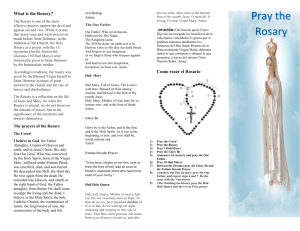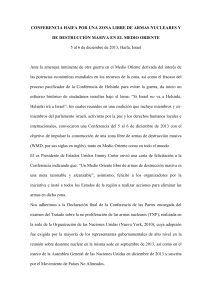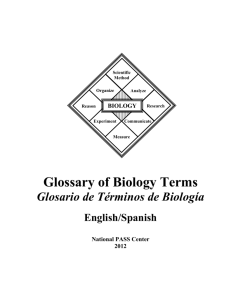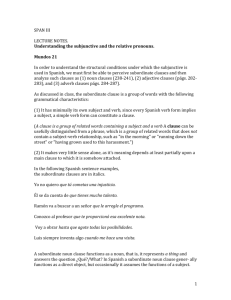October 23rd, 2011
advertisement
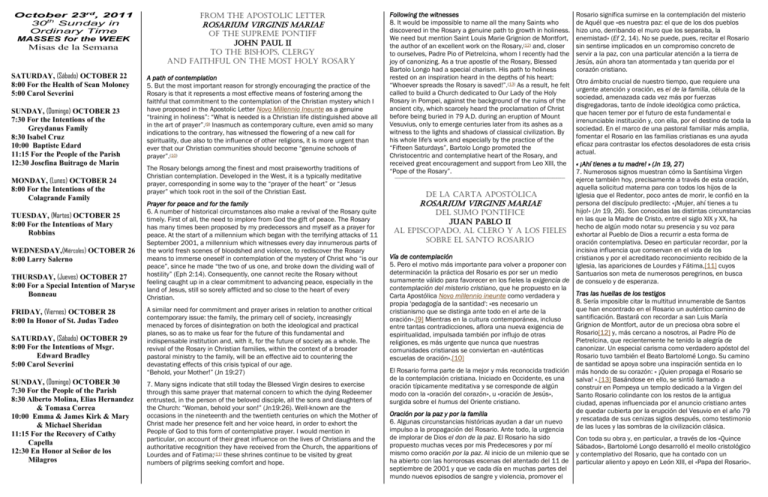
October 23rd, 2011 30th Sunday in Ordinary Time MASSES for the WEEK Misas de la Semana SATURDAY, (Sábado) OCTOBER 22 8:00 For the Health of Sean Moloney 5:00 Carol Severini SUNDAY, (Domingo) OCTOBER 23 7:30 For the Intentions of the Greydanus Family 8:30 Isabel Cruz 10:00 Baptiste Edard 11:15 For the People of the Parish 12:30 Josefina Buitrago de Marin MONDAY, (Lunes) OCTOBER 24 8:00 For the Intentions of the Colagrande Family TUESDAY, (Martes) OCTOBER 25 8:00 For the Intentions of Mary Robbins WEDNESDAY,(Miércoles ) OCTOBER 26 8:00 Larry Salerno THURSDAY, (Jueves) OCTOBER 27 8:00 For a Special Intention of Maryse Bonneau FRIDAY, (Viernes) OCTOBER 28 8:00 In Honor of St. Judas Tadeo SATURDAY, (Sábado) OCTOBER 29 8:00 For the Intentions of Msgr. Edward Bradley 5:00 Carol Severini SUNDAY, (Domingo) OCTOBER 30 7:30 For the People of the Parish 8:30 Alberto Molina, Elias Hernandez & Tomasa Correa 10:00 Emma & James Kirk & Mary & Michael Sheridan 11:15 For the Recovery of Cathy Capella 12:30 En Honor al Señor de los Milagros FROM THE APOSTOLIC LETTER ROSARIUM VIRGINIS MARIAE OF THE SUPREME PONTIFF JOHN PAUL II TO THE BISHOPS, CLERGY AND FAITHFUL ON THE MOST HOLY ROSARY A path of contemplation 5. But the most important reason for strongly encouraging the practice of the Rosary is that it represents a most effective means of fostering among the faithful that commitment to the contemplation of the Christian mystery which I have proposed in the Apostolic Letter Novo Millennio Ineunte as a genuine “training in holiness”: “What is needed is a Christian life distinguished above all in the art of prayer”.(9) Inasmuch as contemporary culture, even amid so many indications to the contrary, has witnessed the flowering of a new call for spirituality, due also to the influence of other religions, it is more urgent than ever that our Christian communities should become “genuine schools of prayer”.(10) The Rosary belongs among the finest and most praiseworthy traditions of Christian contemplation. Developed in the West, it is a typically meditative prayer, corresponding in some way to the “prayer of the heart” or “Jesus prayer” which took root in the soil of the Christian East. Prayer for peace and for the family 6. A number of historical circumstances also make a revival of the Rosary quite timely. First of all, the need to implore from God the gift of peace. The Rosary has many times been proposed by my predecessors and myself as a prayer for peace. At the start of a millennium which began with the terrifying attacks of 11 September 2001, a millennium which witnesses every day innumerous parts of the world fresh scenes of bloodshed and violence, to rediscover the Rosary means to immerse oneself in contemplation of the mystery of Christ who “is our peace”, since he made “the two of us one, and broke down the dividing wall of hostility” (Eph 2:14). Consequently, one cannot recite the Rosary without feeling caught up in a clear commitment to advancing peace, especially in the land of Jesus, still so sorely afflicted and so close to the heart of every Christian. A similar need for commitment and prayer arises in relation to another critical contemporary issue: the family, the primary cell of society, increasingly menaced by forces of disintegration on both the ideological and practical planes, so as to make us fear for the future of this fundamental and indispensable institution and, with it, for the future of society as a whole. The revival of the Rosary in Christian families, within the context of a broader pastoral ministry to the family, will be an effective aid to countering the devastating effects of this crisis typical of our age. “Behold, your Mother!” (Jn 19:27) 7. Many signs indicate that still today the Blessed Virgin desires to exercise through this same prayer that maternal concern to which the dying Redeemer entrusted, in the person of the beloved disciple, all the sons and daughters of the Church: “Woman, behold your son!” (Jn19:26). Well-known are the occasions in the nineteenth and the twentieth centuries on which the Mother of Christ made her presence felt and her voice heard, in order to exhort the People of God to this form of contemplative prayer. I would mention in particular, on account of their great influence on the lives of Christians and the authoritative recognition they have received from the Church, the apparitions of Lourdes and of Fatima;(11) these shrines continue to be visited by great numbers of pilgrims seeking comfort and hope. Following the witnesses 8. It would be impossible to name all the many Saints who discovered in the Rosary a genuine path to growth in holiness. We need but mention Saint Louis Marie Grignion de Montfort, the author of an excellent work on the Rosary,(12) and, closer to ourselves, Padre Pio of Pietrelcina, whom I recently had the joy of canonizing. As a true apostle of the Rosary, Blessed Bartolo Longo had a special charism. His path to holiness rested on an inspiration heard in the depths of his heart: “Whoever spreads the Rosary is saved!”.(13) As a result, he felt called to build a Church dedicated to Our Lady of the Holy Rosary in Pompei, against the background of the ruins of the ancient city, which scarcely heard the proclamation of Christ before being buried in 79 A.D. during an eruption of Mount Vesuvius, only to emerge centuries later from its ashes as a witness to the lights and shadows of classical civilization. By his whole life's work and especially by the practice of the “Fifteen Saturdays”, Bartolo Longo promoted the Christocentric and contemplative heart of the Rosary, and received great encouragement and support from Leo XIII, the “Pope of the Rosary”. Rosario significa sumirse en la contemplación del misterio de Aquél que «es nuestra paz: el que de los dos pueblos hizo uno, derribando el muro que los separaba, la enemistad» (Ef 2, 14). No se puede, pues, recitar el Rosario sin sentirse implicados en un compromiso concreto de servir a la paz, con una particular atención a la tierra de Jesús, aún ahora tan atormentada y tan querida por el corazón cristiano. de implorar de Dios el don de la paz. El Rosario ha sido propuesto muchas veces por mis Predecesores y por mí mismo como oración por la paz. Al inicio de un milenio que se ha abierto con las horrorosas escenas del atentado del 11 de septiembre de 2001 y que ve cada día en muchas partes del mundo nuevos episodios de sangre y violencia, promover el Con toda su obra y, en particular, a través de los «Quince Sábados», Bartolomé Longo desarrolló el meollo cristológico y contemplativo del Rosario, que ha contado con un particular aliento y apoyo en León XIII, el «Papa del Rosario». Otro ámbito crucial de nuestro tiempo, que requiere una urgente atención y oración, es el de la familia, célula de la sociedad, amenazada cada vez más por fuerzas disgregadoras, tanto de índole ideológica como práctica, que hacen temer por el futuro de esta fundamental e irrenunciable institución y, con ella, por el destino de toda la sociedad. En el marco de una pastoral familiar más amplia, fomentar el Rosario en las familias cristianas es una ayuda eficaz para contrastar los efectos desoladores de esta crisis actual. « ¡Ahí tienes a tu madre! » (Jn 19, 27) 7. Numerosos signos muestran cómo la Santísima Virgen ---------------------------------------------------------------------------------------------------------------------------------------ejerce también hoy, precisamente a través de esta oración, aquella solicitud materna para con todos los hijos de la DE LA CARTA APOSTÓLICA Iglesia que el Redentor, poco antes de morir, le confió en la persona del discípulo predilecto: «¡Mujer, ahí tienes a tu ROSARIUM VIRGINIS MARIAE hijo!» (Jn 19, 26). Son conocidas las distintas circunstancias DEL SUMO PONTÍFICE en las que la Madre de Cristo, entre el siglo XIX y XX, ha JUAN PABLO II hecho de algún modo notar su presencia y su voz para AL EPISCOPADO, AL CLERO Y A LOS FIELES exhortar al Pueblo de Dios a recurrir a esta forma de SOBRE EL SANTO ROSARIO oración contemplativa. Deseo en particular recordar, por la incisiva influencia que conservan en el vida de los Vía de contemplación cristianos y por el acreditado reconocimiento recibido de la 5. Pero el motivo más importante para volver a proponer con Iglesia, las apariciones de Lourdes y Fátima,[11] cuyos determinación la práctica del Rosario es por ser un medio Santuarios son meta de numerosos peregrinos, en busca sumamente válido para favorecer en los fieles la exigencia de de consuelo y de esperanza. contemplación del misterio cristiano, que he propuesto en la Tras las huellas de los testigos Carta Apostólica Novo millennio ineunte como verdadera y 8. Sería imposible citar la multitud innumerable de Santos propia 'pedagogía de la santidad': «es necesario un que han encontrado en el Rosario un auténtico camino de cristianismo que se distinga ante todo en el arte de la santificación. Bastará con recordar a san Luis María oración».[9] Mientras en la cultura contemporánea, incluso Grignion de Montfort, autor de un preciosa obra sobre el entre tantas contradicciones, aflora una nueva exigencia de Rosario[12] y, más cercano a nosotros, al Padre Pío de espiritualidad, impulsada también por influjo de otras Pietrelcina, que recientemente he tenido la alegría de religiones, es más urgente que nunca que nuestras canonizar. Un especial carisma como verdadero apóstol del comunidades cristianas se conviertan en «auténticas Rosario tuvo también el Beato Bartolomé Longo. Su camino escuelas de oración».[10] de santidad se apoya sobre una inspiración sentida en lo El Rosario forma parte de la mejor y más reconocida tradición más hondo de su corazón: « ¡Quien propaga el Rosario se de la contemplación cristiana. Iniciado en Occidente, es una salva! ».[13] Basándose en ello, se sintió llamado a oración típicamente meditativa y se corresponde de algún construir en Pompeya un templo dedicado a la Virgen del modo con la «oración del corazón», u «oración de Jesús», Santo Rosario colindante con los restos de la antigua surgida sobre el humus del Oriente cristiano. ciudad, apenas influenciada por el anuncio cristiano antes de quedar cubierta por la erupción del Vesuvio en el año 79 Oración por la paz y por la familia y rescatada de sus cenizas siglos después, como testimonio 6. Algunas circunstancias históricas ayudan a dar un nuevo de las luces y las sombras de la civilización clásica. impulso a la propagación del Rosario. Ante todo, la urgencia
